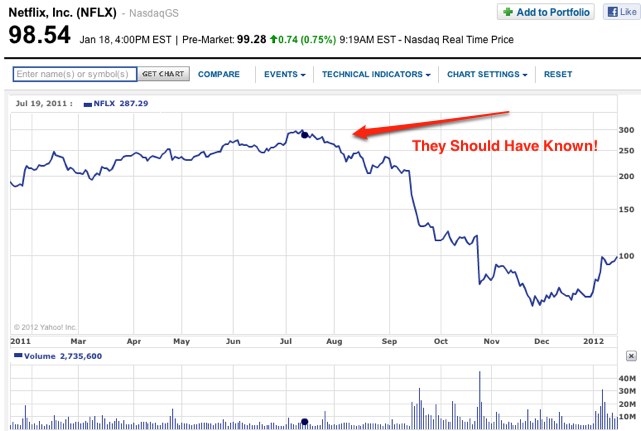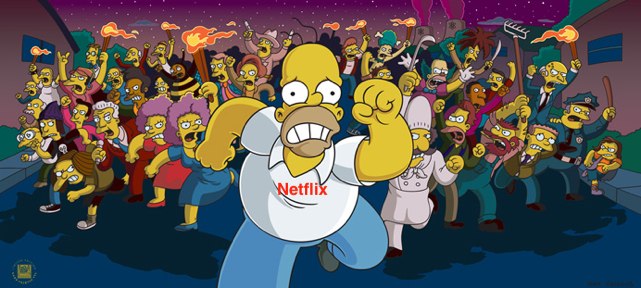Whenever a broadly held stock like Netflix takes a huge hit, the shareholder lawsuits are not far behind. Back in September, Netflix shares took a 70 percent dive after the company raised subscription prices and announced a (since-cancelled) plan to separate its DVD and streaming businesses.
Armed with pitchforks and hindsight, class action lawyers are gathering up mobs of angry shareholders who lost money and going after the company. Earlier this week a lawsuit was filed against Netflix senior management for not disclosing the short-term nature of its contracts to stream certain movies. And this morning a shareholder rights group called Robbins Umeda announced an “investigation” which could lead to another class-action suit.
Robbins Umeda thinks it can make a case against Netflix board members for selling shares back when they were “artificially inflated” at the same time that they were approving share buybacks from the company. Here is Robbins Umeda’s reasoning, such as it is:
In particular, the firm is investigating allegations that members of the board of directors were unjustly enriched by a scheme that caused Netflix to buyback the company’s stock at artificially inflated prices.
In particular, between 2007 and June 30, 2011, members of the board oversaw the Company’s purchase of $994 million worth of its own company’s stock at allegedly inflated prices. Further, fiduciaries of the company continued with the ill-advised buyback program despite the fact that: (a) Netflix would soon be forced to raise subscription costs; (b) that the company was losing access to some of its premium content; and (c) that officials were planning to separate the company’s mail and online service platforms.
Of course, all of this is 20/20 hindsight. Share buybacks are usually considered a good thing for existing shareholders because they reduce the number of shares outstanding, thus spreading earnings across a smaller number of shares (which can boost earnings per share). Basically, these lawsuits want to punish Netflix management and board members for selling their stock when the price was high.
But these lawsuits are the equivalent of saying, “They should have known!” More likely, if Reed Hastings and his senior management team, as well as Netflix board members, would have known what the impact of its changes to Netflix shares and its brand, they would have taken a different course. But they didn’t know because they couldn’t predict the future. What is clear in hindsight is murky at the time of the decision.
I am not defending how Hastings & Co. dealt with the price changes and shifts in strategy. I just don’t think they had any clue how big the backlash would be.
But here’s the thing. These lawsuits are always looking in the rearview mirror. Netflix shares hit a low of $64 in November from a high near $300 back in July. But today, the stock is trading back st $98. I guarantee you that any money a shareholder would see years from now as a result of a successful shareholder lawsuit (where individuals typically get pennies on the dollar after all the lawyer’s fees) will be a tiny fraction of what their shares would be worth if they had just held onto them. You didn’t lose any money unless you were dumb enough to sell your shares at the bottom.
I don’t own any shares of Netflix, but I sure wish I had bought some last November.

